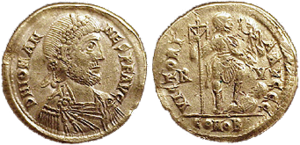Johannes (Emperor)

Johannes († May 425 in Ravenna ) was the usurper of Western Roman Emperor from 423 to 425.
Life
After the sudden death of the Western Roman Emperor Honorius on August 15, 423 in Ravenna, the Western Roman Empire experienced a three-month period without an emperor . Although his nephew, the Eastern Roman Emperor Theodosius II , was formally heir to the childless Honorius, which de iure restored imperial unity, this could not be sustained for long: for decades it was common for at least two emperors to form the two halves of the Roman Empire ruled. However, Theodosius hesitated to appoint a new Augustus for the West, presumably in the absence of a suitable candidate, but perhaps also because he was planning to rule the entire empire alone from now on.
In this situation, John was proclaimed emperor on November 20, 423 in Rome (probably by the Senate and the Guard) , at the time of his primicerius notariorum and thus responsible for the lists of troops and letters of appointment . John was a Christian and according to a source (albeit a very late one) supposedly of Gothic descent. Although John is praised in the sources, he did not find widespread recognition, especially in the military: In addition to Theodosius II in Constantinople , the comes Africae Bonifatius in particular refused him recognition, while in Gaul the Praetorian Prefect of John was murdered by the legions there. The behavior of Boniface is likely to be related to the fact that his rival, the curopalatus Aëtius , decidedly behind John. Probably Aëtius 'father, Gaudentius' second master in the army, was even the driving force behind the usurpation. The Roman army of Italy under the first magister militum (army master) Castinus , who was appointed consul by John for 424, held back and initially remained largely neutral.
Johannes tried hard to be recognized by Ostrom as emperor, but ultimately in vain. Boniface blocked the grain supply to Rome, which is why John mobilized his available military forces against him and attacked him repeatedly, but without success. In October 424, the Eastern Emperor Theodosius II made his young cousin Valentinian, the son of Honorius' sister Galla Placidia , Caesar , designated him as the new ruler of the West and betrothed him to his daughter. Valentinian was the son of the powerful army master and short-term emperor Constantius III. , whose relations with Theodosius II had been bad, and he was still a small child. Both may explain why Theodosius was only now supporting him. However, Theodosius never seems to have thought of recognizing John, who was not related to the imperial family. After the reign of John met resistance in Gaul and Africa, Theodosius decided to act. He appointed the magister militum Ardaburius commander in chief of an army that Valentinian was to install as emperor in Italy and overthrow John. Ardaburius took command of the fleet and sent his son Aspar ahead by land. This could take Aquileia in a coup.
John, who had waited in vain for Hunnic and Germanic auxiliaries under the command of Aëtius, was ultimately overthrown by treason: Ardaburius fell into his hands by chance, but was treated courteously, since John was still hoping for an agreement with Theodosius II . Ardaburius succeeded in inciting a number of Western Roman officers, whom the usurper had removed from their posts in 423, to a coup against the civilian Johannes, which also succeeded. After his capture, Johannes was beheaded in May 425 after his hand had been cut off. Three days after his death there was a bloody battle between Aspar and Aëtius, but it ended in a draw. Aëtius then came to an understanding with Ardaburius and Aspar and entered the service of the new Western Roman government as a comes . Valentinian III. was raised a little later to Augustus , installed as emperor in the west and recognized by Ostrom. John's legal dispositions were revoked.
A good 100 years later, the Greek historian Prokopios described John in a strikingly positive way as a man of mild nature, very clever and capable. He ruled as a usurper for five years [in fact it was barely a year and a half] , but in a moderate manner; he did not listen to slanderers, had anyone unjustly executed, or made a fortune. But he could do nothing against the barbarians, since he had east current as the enemy . Furthermore, among others, Olympiodoros von Thebes , Socrates Scholastikos , Philostorgios , various late antique chronicles and Gregory of Tours (based on Renatus Profuturus Frigeridus ) reported on his reign.
literature
- Alexander Demandt : The late antiquity. 2nd Edition. Munich 2007, p. 183.
- John Robert Martindale, John Morris: The Prosopography of the Later Roman Empire (PLRE). Volume 2, Cambridge University Press, Cambridge 1980, ISBN 0-521-20159-4 , pp. 594f.
- Otto Seeck : History of the fall of the ancient world. Volume 6. Stuttgart 1920, pp. 90ff.
Web links
- Hugh Elton: Short biography (English) at De Imperatoribus Romanis (with references).
Remarks
- ↑ Nikephoros Kallistu Xanthopulos 14.7.
- ^ According to Philostorgios ( Church History 12:13), John had been brought to Aquileia for execution.
- ↑ Procopius, histories , 3,3,6-7.
- ^ Sources overview in PLRE Volume 2, pp. 594f. ( Ioannes 6).
| predecessor | Office | successor |
|---|---|---|
| Honorius |
Western Roman Emperor 423-425 |
Valentinian III. |
| personal data | |
|---|---|
| SURNAME | John |
| BRIEF DESCRIPTION | Western Roman emperor |
| DATE OF BIRTH | 4th century |
| DATE OF DEATH | May 425 |
| Place of death | Ravenna |